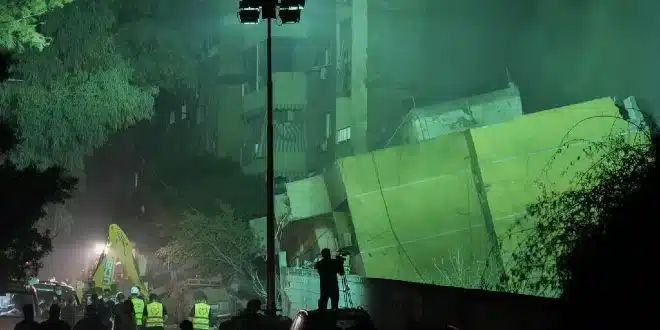Israeli fighter jets launched a series of heavy airstrikes on the southern suburbs of Beirut overnight into Saturday, reportedly targeting Hezbollah’s headquarters. Some reports claimed that one of the strikes aimed at Hezbollah’s leader, Sayyed Hassan Nasrallah, although sources close to the group said he was unharmed.
Israel stated it was attacking Hezbollah’s command centers and weapons facilities. The strikes were some of the most intense on the group’s stronghold since the 2006 war between Israel and Hezbollah.
On Friday night, the sound of relentless shelling echoed across Beirut, and Israel issued warnings for residents in certain parts of the city to evacuate. Hundreds of families fled their homes, many seeking refuge in central Beirut or along the coast.
Radwan Msallam, a Syrian refugee and father of six, described the chaos: “We had nowhere to go. We took what we could and left.”
While Israeli officials did not confirm if Nasrallah was killed, they claimed responsibility for eliminating Muhammad Ali Ismail, a commander of Hezbollah’s missile unit, along with other senior figures in the organization.
Speaking at the U.N. General Assembly, Israeli Prime Minister Benjamin Netanyahu reaffirmed Israel’s commitment to fight Hezbollah until the threat to Israel’s border was fully neutralized.
Hezbollah has been carrying out low-level attacks on Israel since the Hamas attack on October 7, escalating the conflict. In response, Israel has increasingly shifted its military focus from Gaza to Lebanon, where ongoing airstrikes have killed over 700 people and displaced around 118,000.
The initial Israeli strike on Beirut hit Hezbollah’s central headquarters, located beneath residential buildings in the Dahiyeh district, according to Israeli military spokesperson Daniel Hagari. A source close to Hezbollah stated that six buildings were destroyed in the first wave of strikes. Lebanon’s health ministry reported that six people were killed, and 91 were injured.
A second wave of attacks followed early on Saturday, targeting additional locations in the southern suburbs. Israel also carried out airstrikes in the Bekaa Valley and the city of Tyre.
There has been no official confirmation of Nasrallah’s status since the airstrikes.
Amid the escalating violence, Hezbollah claimed responsibility for a rocket attack on northern Israel in retaliation, stating that it was defending Lebanon and its people.
Fears of a full-scale regional conflict have grown, with Israel raising the possibility of a ground invasion against Hezbollah. U.N. Secretary-General Antonio Guterres urged world leaders to avoid further escalation and to seek a ceasefire.
In his U.N. address, Netanyahu also addressed the war in Gaza, pledging that Israel would fight Hamas until “total victory” was achieved. Diplomats have emphasized that efforts to end the fighting in Gaza are crucial to preventing further conflict in Lebanon.
Hamas’ attack on Israel on October 7 resulted in the deaths of over 1,200 people, most of them civilians, according to Israeli figures.
Amid growing tensions, Netanyahu issued a warning to Iran, saying that if Tehran strikes Israel, “we will strike you.” He added that Israel’s reach extends throughout the Middle East, including Iran.
Iran has condemned Israel’s actions, with its embassy in Lebanon describing the strikes as a dangerous escalation, while President Masoud Pezeshkian denounced them as “flagrant war crimes.”


